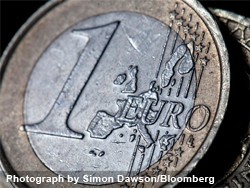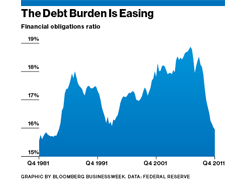
As Europe’s sovereign debt crisis has ground on and the once unthinkable prospect of a breakup of the Continent’s currency union has become a realistic possibility, the euro itself has remained surprisingly resilient, especially against the dollar. With a few exceptions, the euro has traded over $1.30 for the past couple of years. Why, I wondered, hasn’t all of the hemming and hawing among Europe’s leaders taken more of a toll on the common currency? This is a matter of particular importance to me as I plan a move to Berlin, where I might consider buying an apartment—if I could be confident that my investment won’t lose a big chunk of its value due to a strengthening dollar.
So I figured I’d call some experts to find out what gives. The bottom line: It’s not so much a case of a strong euro as it is a weak dollar, and neither is particularly attractive when compared with such superstars as the Swiss franc, Australian dollar, and the Japanese yen. The dollar-euro “market is a battle of ugly currencies,” Neil Mellor, a currency strategist at Bank of New York Mellon (BK) in London, told me. Since the U.S. Federal Reserve shows no signs of tightening monetary policy, there’s not a lot of incentive for traders to buy dollars. “There has been a policy of debasement of the currency by the Fed, and I don’t think that’s going to change any time soon,” Mellor said.
Fair enough, but still worrisome for someone considering a big purchase in euros, so I decided to get a second opinion. Sara Yates from Barclays (BCS) didn’t disagree about the euro’s performance against commodity-based currencies such as Australia’s and Canada’s dollars. But she did note some sensible reasons traders have largely supported the euro for the past year or two. While there has been no shortage of dire headlines out of the euro zone, Yates believes enough news has been positive to keep the currency from collapsing. Despite the dithering and dickering across the Continent, Europe’s leadership has managed to put together a bailout for Greece, and the European Central Bank has propped up commercial banks with €1 trillion in three-year loans. “There are problems remaining,” Yates said, “but in a sense the euro area is better protected against a blowup than it was a couple of years ago.”
It has also probably been getting substantial support from China and the Middle East. While most countries still hold their currency reserves in dollars, there’s little doubt that many would like to diversify their holdings. It’s hard to find figures that show what central banks are up to, but it’s pretty clear that when the euro starts falling, banks around the world start buying. As the price of crude has surged, Middle Eastern countries have found themselves with lots of cash, and “they have to diversify some of the dollars they get from oil sales,” said Chris Walker, a currency strategist with UBS (UBS) in London.
Nick Bennenbroek, head of currency strategy for Wells Fargo (WFC) in New York, pointed out that some of the euro’s resilience this year is because much of the negative sentiment had already been priced into the euro-dollar rate in late 2011. Still, he and the other currency strategists I spoke to all predicted a further weakening of the euro against the dollar in the next six to 12 months, to somewhere between $1.20 and $1.25. (Bloomberg’s survey of 54 traders or strategists is predicting the euro will trade at $1.30 in the fourth quarter.) “Investors are still worried about the longer-term fundamentals of the euro,” Bennenbroek said. “We’re going to see slow growth or even recession in Europe, [which] will cause the euro to weaken over time.”
And what if the euro disintegrates? None of the people I spoke with would rule it out. Richard Franulovich, a strategist at Westpac Banking (WBC) in New York, said his “base case” is that Greece will exit the euro zone within 12 to 18 months. “At some point, the population will say they’re better off outside the euro,” Franulovich said. And after that? “If Greece were to exit, you could easily see the ECB shedding all its conservatism and guaranteeing all euro bonds to keep other weak countries in the currency union.” Of course, he allows, the opposite could also happen and the ECB might say it’s best to let other weak economies go their own way. “If the euro breaks up, there could be an incalculable chain of events,” he said with what sounded like a grimace over the phone. Predicting what might happen “is like trying to unscramble an egg.”
Maybe I’ll hold off on buying that apartment after all.
By David Rocks - Source: Bloomberg Businessweek

3.jpg)



















